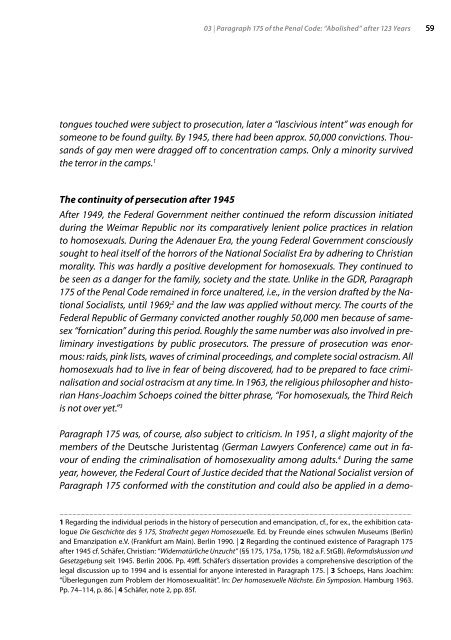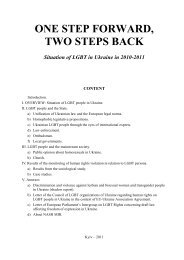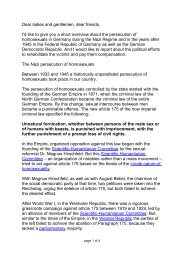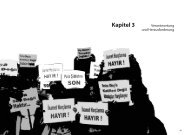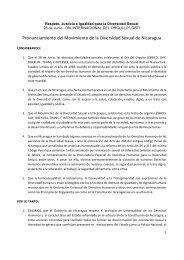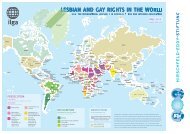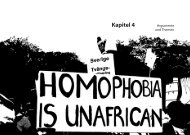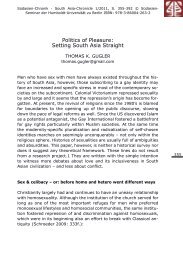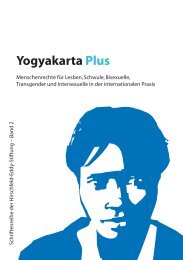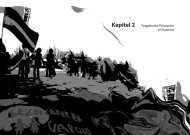Vom Verbot zur Gleichberechtigung - Hirschfeld-Eddy-Stiftung
Vom Verbot zur Gleichberechtigung - Hirschfeld-Eddy-Stiftung
Vom Verbot zur Gleichberechtigung - Hirschfeld-Eddy-Stiftung
Sie wollen auch ein ePaper? Erhöhen Sie die Reichweite Ihrer Titel.
YUMPU macht aus Druck-PDFs automatisch weboptimierte ePaper, die Google liebt.
03 | Paragraph 175 of the Penal Code: “Abolished” after 123 Years 59<br />
tongues touched were subject to prosecution, later a “lascivious intent” was enough for<br />
someone to be found guilty. By 1945, there had been approx. 50,000 convictions. Thousands<br />
of gay men were dragged off to concentration camps. Only a minority survived<br />
the terror in the camps. 1<br />
The continuity of persecution after 1945<br />
After 1949, the Federal Government neither continued the reform discussion initiated<br />
during the Weimar Republic nor its comparatively lenient police practices in relation<br />
to homosexuals. During the Adenauer Era, the young Federal Government consciously<br />
sought to heal itself of the horrors of the National Socialist Era by adhering to Christian<br />
morality. This was hardly a positive development for homosexuals. They continued to<br />
be seen as a danger for the family, society and the state. Unlike in the GDR, Paragraph<br />
175 of the Penal Code remained in force unaltered, i.e., in the version drafted by the National<br />
Socialists, until 1969; 2 and the law was applied without mercy. The courts of the<br />
Federal Republic of Germany convicted another roughly 50,000 men because of samesex<br />
“fornication” during this period. Roughly the same number was also involved in preliminary<br />
investigations by public prosecutors. The pressure of prosecution was enormous:<br />
raids, pink lists, waves of criminal proceedings, and complete social ostracism. All<br />
homosexuals had to live in fear of being discovered, had to be prepared to face criminalisation<br />
and social ostracism at any time. In 1963, the religious philosopher and historian<br />
Hans-Joachim Schoeps coined the bitter phrase, “For homosexuals, the Third Reich<br />
is not over yet.” 3<br />
Paragraph 175 was, of course, also subject to criticism. In 1951, a slight majority of the<br />
members of the Deutsche Juristentag (German Lawyers Conference) came out in favour<br />
of ending the criminalisation of homosexuality among adults. 4 During the same<br />
year, however, the Federal Court of Justice decided that the National Socialist version of<br />
Paragraph 175 conformed with the constitution and could also be applied in a demo-<br />
.............................................................................................................................................................................................................................................................................<br />
1 Regarding the individual periods in the history of persecution and emancipation, cf., for ex., the exhibition catalogue<br />
Die Geschichte des § 175, Strafrecht gegen Homosexuelle. Ed. by Freunde eines schwulen Museums (Berlin)<br />
and Emanzipation e.V. (Frankfurt am Main). Berlin 1990. | 2 Regarding the continued existence of Paragraph 175<br />
after 1945 cf. Schäfer, Christian: “Widernatürliche Unzucht” (§§ 175, 175a, 175b, 182 a.F. StGB). Reformdiskussion und<br />
Gesetzgebung seit 1945. Berlin 2006. Pp. 49ff. Schäfer’s dissertation provides a comprehensive description of the<br />
legal discussion up to 1994 and is essential for anyone interested in Paragraph 175. | 3 Schoeps, Hans Joachim:<br />
“Überlegungen zum Problem der Homosexualität”. In: Der homosexuelle Nächste. Ein Symposion. Hamburg 1963.<br />
Pp. 74–114, p. 86. | 4 Schäfer, note 2, pp. 85f.


